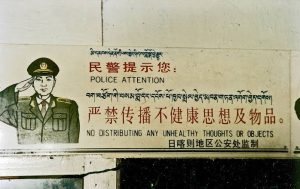China: Stop land seizures and bride trafficking in Tibetan township in Nyalam County

The Tibetan Centre for Human Rights and Democracy (TCHRD) has been informed by a reliable source about human rights violations pertaining to land, livelihood and women’s rights in Zurtso (Ch: Suozuo) Township, Nyalam (Ch: Nielamu) County, Shigatse (Ch: Xigaze) Prefecture, Tibet Autonomous Region, in the Tibetan province of U-Tsang.
Local Chinese authorities have been attempting to relocate residents of Zurtso Township to nearby government-built housing facilities for quite sometime. The local authorities claim that the old houses had become unstable due to the tremors felt during the 2015 earthquake that wrought extensive damage on neighbouring Nepal.
The source, who asked to remain anonymous to protect his family in Tibet, told TCHRD that the new double-storied housing facilities lacked spaces for keeping cattle or growing crops. Majority of local Tibetans in the region are agropastoralists. “Although much of the local land is being fenced and made off-limits for grazing by the government, [local Tibetans] still have some land available to grow food and graze their cattle. If they move into the new houses that are built cheek by jowl, they will lose their land and livelihood sources without adequate compensation.”
The 7.9 magnitude earthquake that struck Nepal on 25 April 2015 sent tremors throughout the neighbouring Tibetan counties of Kyirong (Ch: Gyirong) and Nyalam and the local authorities have been using this as an excuse to deprive the local Tibetans of their traditional land and livelihood. The source added that Chinese authorities are putting pressure on residents of Zurtso to leave their ancestral houses and move to the new houses. “The old houses had sustained minor cracks but this is used an excuse to displace and dispossess the whole community”.
Many local residents have so far resisted the government’s attempts to move them. Among them was Mr Wangchuk who had emerged as one of the strongest voices against the relocation project. As TCHRD reported last month, Mr Wangchuk, 45, had been detained by Chinese police officers in March this year for sharing banned books online.
Bride Trafficking
In recent years, Chinese migrants working on government construction projects in Shigatse have asked many young Tibetan women in Zurtso and other townships for their hand in marriage. The migrants would usually negotiate with the parents of the would-be bride and make payments of a few thousand yuans as the price for the bride.
“Some of these marriages have proved genuine and the parents have been able to keep track of their daughters’ whereabouts and wellbeing. However, there are also an increasing number of cases wherein young women from our villages have never been heard or seen since they left with their so-called husbands to faraway places in China,” the same source informed TCHRD.
There is mounting concern among local Tibetans particularly the parents of missing Tibetan women that their daughters have become victims of bride trafficking and prostitution. The situation is becoming worse with the arrival of more Chinese migrants who mainly target young Tibetan women from poorer families in rural towns in and around Shigatse.
Recently, international human rights organisations have reported on the issue of China’s bride trafficking problem, which is enabled by the country’s massive gender imbalance and lack of protections for victims. Much of these investigations focused on young rural women from Southeast Asia and South Asia who are sold for several thousand US dollars by brokers to Chinese families and then “held prisoner and pressured to produce babies as quickly as possible”.
Not much has been known or reported about this issue affecting Tibetan women. However, Chinese authorities have for years actively promoted interethnic marriages between Tibetan and Chinese to the extent that those entering interethnic marriages are provided incentives in the form of subsidized housing, education, employment and other welfare benefits. Many analysts view this as a brazen attempt by Chinese authorities to dilute Tibetan identity and stamp out political resistance against Chinese rule.
TCHRD notes with concern that Tibetans in Zurtso and neighbouring townships are subjected to various human rights violations and calls on the Chinese authorities to launch immediate and impartial investigation into the whereabouts and wellbeing of the missing Tibetan women. Effective measures at the policy and legal level must be initiated to protect Tibetan women and girls from gender discrimination and reproductive rights violations.
TCHRD further calls on the Chinese authorities to obtain free, prior, and informed consent from local Tibetans in Zurtso Township so that they are not subjected to displacement and dispossession. The right to land, resources, and livelihood of local Tibetans must be respected and guaranteed if Chinese authorities are serious about alleviating poverty and improving the lives of ordinary Tibetans. Chinese authorities must take into account all the risks posed by the so-called development projects such as land seizures, deprivation of livelihood sources, unemployment, and economic insecurity.
